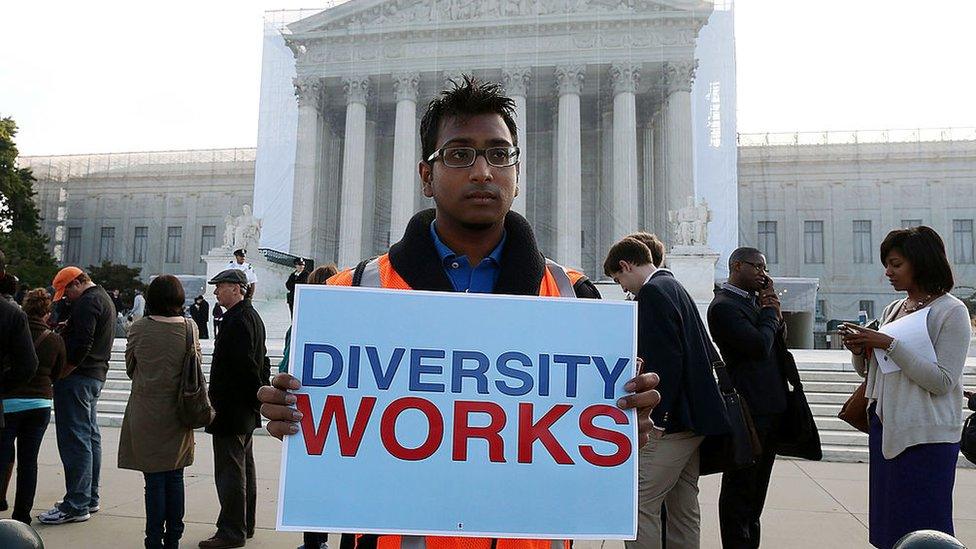Affirmative action: Why this teen says he was rejected by top US colleges
- Published
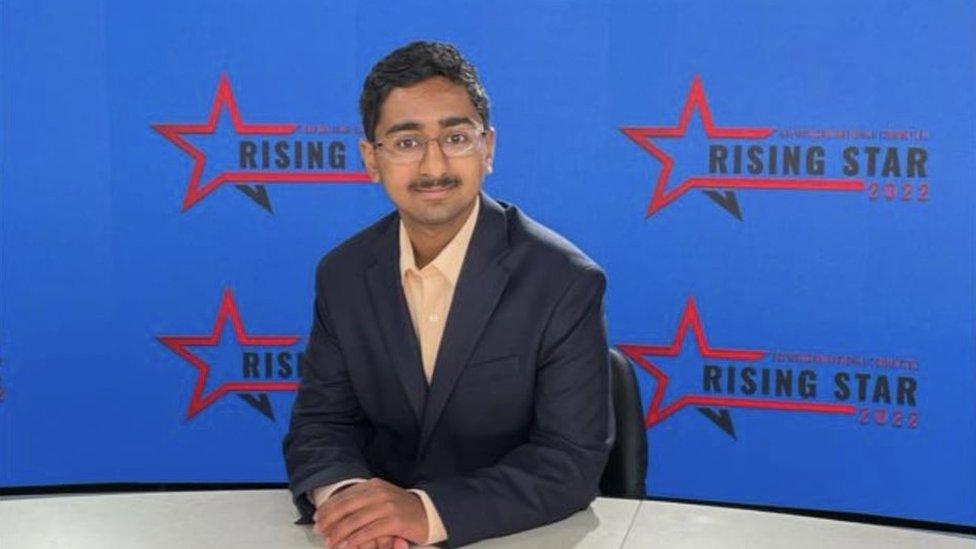
Rutvij Holay says he was rejected from Ivy League schools because of his race
For 17-year-old Rutvij Holay, getting into an Ivy League university mattered.
These institutions represent the elite of the elite in higher education in the US.
His parents came to the country from India and "started from scratch", he said, so that he could achieve the American Dream.
"Colleges like Harvard represent a chance to actually build our connection to the country and a chance to make our mark within this world," he told the BBC.
With a resume boasting high test results, work volunteering for political organisations, prestigious leadership awards and the ability to speak five languages, he entered the admissions process with confidence.
He says he applied to 35 different schools, though Harvard was not one of them.
But, he says with a sigh: "I was rejected from all the Ivy League universities."
Although he cannot provide any concrete evidence, Rutvij believes that admissions officers discriminated against him because he is Asian American.
"The worry that myself and many other Asian Americans have is that when admission officer sees Patel, when he sees a Lee, when he sees a Kim, when he sees any Asian last name, basically the image that comes up is kid just sitting in his school on classes studying away math, and not doing anything that has an impact on society," he said.
This argument is at the heart of a battle at the US Supreme Court which could dramatically alter the extent to which universities can consider an applicant's race during the admissions process.
Affirmative action policies, introduced in the Civil Rights Act in the 1960s, are designed to boost the number of black and Hispanic students on college campuses. Supporters say they help traditionally underrepresented groups while ensuring the student body reflects the diversity of the wider population.
Although race-based quotas have been deemed unconstitutional for decades, race can still be one of several factors - such as economic status, gender or religious belief - that are looked at alongside a student's academic scores and personal qualities. Many schools also give preference to the children of alumni, which some argue helps advantage wealthy, white applicants.
Now, two cases before the top court accuse Harvard and the University of North Carolina of discriminating against Asian and white applicants. Justices are expected to deliver a ruling in the coming weeks.
The man on a mission to end affirmative action
Although affirmative action has been challenged in the court before, this Harvard case is unique because it is ethnic minorities questioning the policy.
A largely anonymous group of Asian Americans, as part of Students for Fair Admissions (SFFA), brought the complaint. The group claims membership of about 20,000 students and parents who claim that affirmative action encourages racial discrimination.
A report by Harvard's own researchers found that being Asian American was a disadvantage in the admissions process, external. SFFA also argued in court that Harvard's admissions office scored Asian Americans lower in terms of "personality" than other races, an assertion the school denies.
The group is led by Edward Blum, a legal strategist and head of SFFA who has for decades tried to challenge affirmative action in the courts. Since the 1990s, Mr Blum has orchestrated more than 24 lawsuits, two of which made it to the Supreme Court in 2016, but lost. With a majority of conservative judges now on the court, this may be his chance.
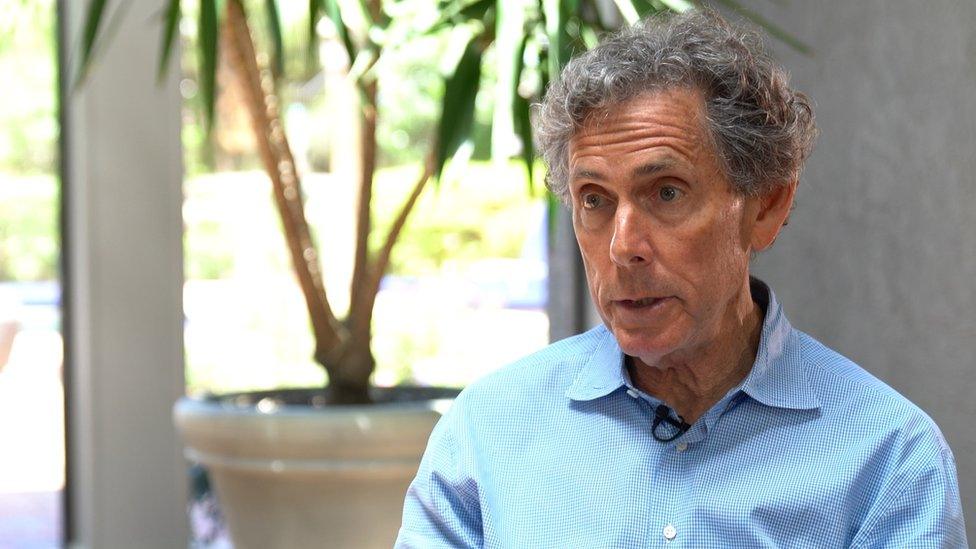
Mr Blum thinks affirmative action policies are harmful and divisive.
"If affirmative action, race-based affirmative action, is eliminated in this country…a black kid at Princeton or Yale will know that he or she was admitted, not because of a thumb on the scale, but because of their academic abilities and their outside interests."
In a statement, Harvard disputed SFFA's case, saying the percentage of Asian Americans admitted has grown by 27%. Both Harvard and the University of North Carolina say the group has irresponsibly misrepresented the facts.
However, during the oral arguments, Mr Blum's group presented to the court a document from Harvard's Office of Institutional Research that showed if they went off academics alone, nearly half of entrants would be Asian Americans.
Mr Blum - a white man - has been accused of seizing on this research and using Asian Americans in his latest attempt to end affirmative action.
Harvard University has accused him, external of saying 'I needed Asian plaintiffs', which he denies. He says accusations that he is pitting Asian Americans against other minorities are "glib".
'My perspective is needed on campus'
The majority of Asian Americans do not think affirmative action is discriminatory. A 2022 poll by AAPI data found that 69% are in favour of the policies.
Harvard student Chelsea Wang, who is Chinese American, told the BBC that campuses had to be as diverse as possible.
"I don't believe that you can learn as much from people who are similar to you as you can from people who are different to you, and from people who have had different life experiences from you."
She views the case being brought by SFFA as misguided.
"I know how much pressure there is within our community sometimes to say that you went to this school or that school. But it makes me a little sad that we are pitting ourselves against other minorities like that," she said.
She said Asian Americans have had advantages compared to other minorities because many of them immigrated on visas tied to their employment and education. This meant their children would have had more support to succeed academically than a student who was the first in their family to go to college.

Affirmative Action On Trial
Are the policies a helping hand or an unfair handout? Listen to our full documentary here.

Some who have benefitted from affirmative action say it can help students overcome obstacles many of their classmates have not had to face.
Jerome Fulton's parents - who did not graduate from high school - were murdered when he was five years old.
Two years ago, he was accepted into Harvard Business School.
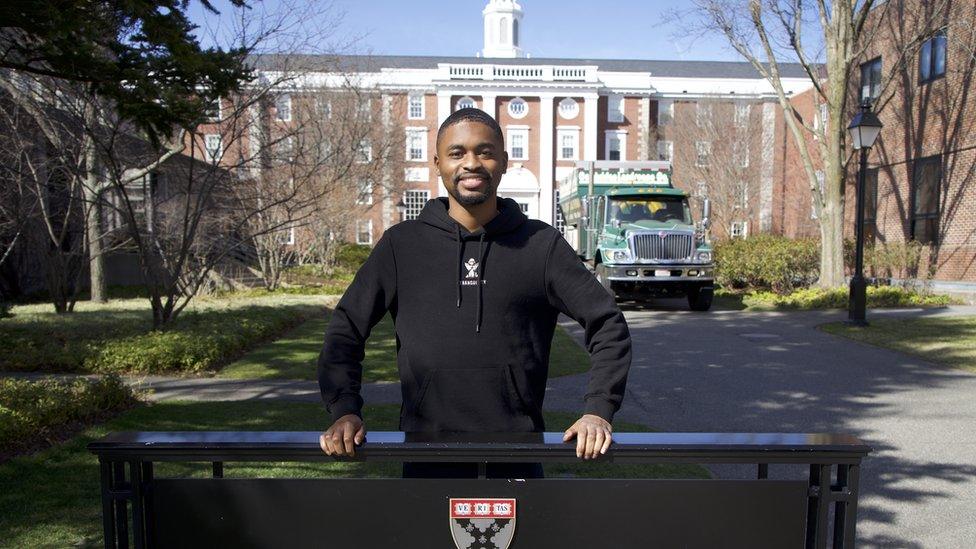
Jerome Fulton says affirmative action helps create an "equitable landscape"
The school promotes the strides it has made in increasing diversity on campus. The proportion of students who are black or African American rose from 7% in 2020 to 12% in 2023. About 13% of the general population in the US is black.
"I can't attribute 100% of anything to that. I know I worked my behind off, but there had to be a set of policies and procedures to help create an equitable landscape for me."
What's his response to those who say he only got in because he's black?
"I would say, so what? When I got into these organisations, I performed, I competed at a very high level in undergrad. I graduated top 10% of my class," he said. "So regardless of if you think I did not get here on my own merit, guess what, when I got here, I outperformed you every single time. If you feel like I'm a diversity admission or diversity hire, so what? I'm needed here and my perspective is needed here."
As for Rutvij, he did get into university in the end, but declined to say where.
However, he says he is happy that he did not benefit from affirmative action policies.
"We are fully smart enough, we're fully capable enough just like any other American to be able to get into top college ourselves," he said. "And we don't need someone else just giving us a handout because they think we're less than."
With additional reporting from Koralie Barrau.
Related topics
- Published31 October 2022
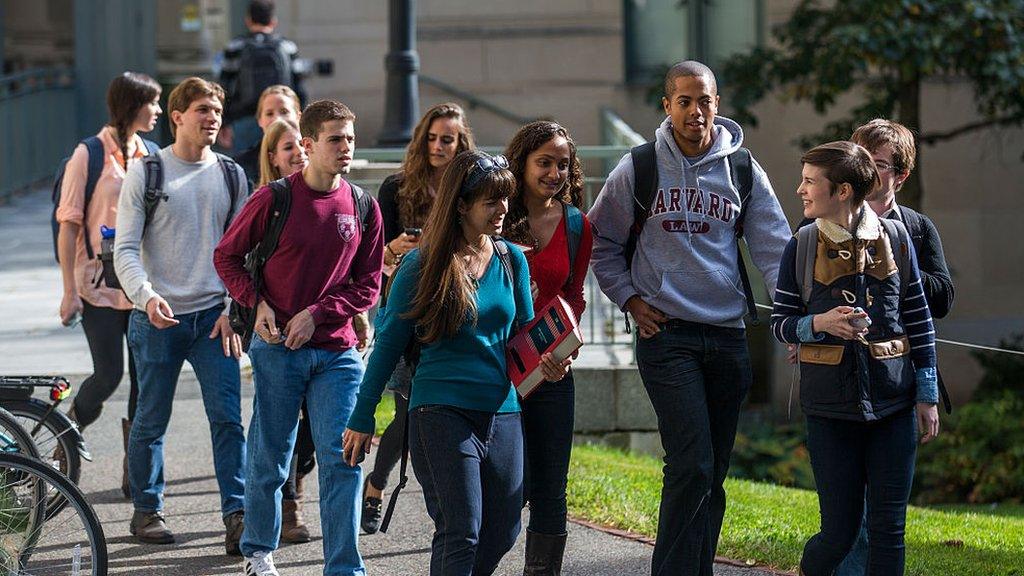
- Published3 August 2017
